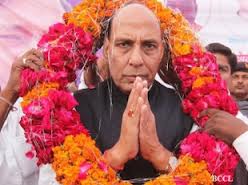
New Delhi, Jan 23: Senior Bharatiya Janata Party (BJP) leader Rajnath Singh on Tuesday emerged as a consensus candidate for the next party president’s post after Nitin Gadkari’s hope of securing a second consecutive term took a blow owing to the Income-Tax Department conducting surveys on companies allegedly linked to his Purti group.
In a late evening development on the eve of BJP president election, Gadkari, who was in Maharashtra along with veteran leader LK Advani to attend a function, resigned as party president.
Rajnath Singh’s candidature appeared acceptable to the Rashtriya Swayamsevak Sangh (RSS).
There was constant opposition from Advani to Gadkari’s second term due to some corruption charges the BJP?chief was facing. The Income-Tax move on Tuesday sealed Gadkari’s fate.
It is learnt that the BJP parliamentary board will meet at 9:30 am on Wednesday to declare former party chief Rajnath Singh’s candidature after he files his nomination.
“I have had the privilege to serve my party, the BJP, as a political worker and finally as its president for one term. As part of my commitment to the weaker sections, particularly farmers, I embarked upon social enterprises to serve society. I have committed no wrong or any impropriety either directly or indirectly.
Yet the UPA government has been making efforts to spread disinformation about me in order to hurt me and my party. I have always said that I am ready for any independent enquiry. I shall fight these efforts of this government both politically and legally,” Gadkari said in a statement.
“I do not wish that this should in any way adversely affect the interests of the BJP. I have, therefore, decided not to seek a second term as the president of the BJP. I am extremely grateful to all my colleagues and the cadre of the BJP who have cooperated with me during my term as a president,” he announced.
Gadkari was forced to withdraw himself from the race on a day of dramatic developments. It started with the news of IT- conducting surveys on companies linked with the Purti Group. Till afternoon, the BJP insisted that the surveys had nothing to do with the Purti Group. Gadkari himself issued a press release to condemn the I-T inquiries, which he described as “calculated, mischievous and politically motivated.”
In the evening, former Union minister Yashwant Sinha procured nomination papers and a voters’ list from chief electoral officer Thawar Chand Gehlot. Earlier, Mahesh Jethmalani complained that he was not given nomination papers though he was also, like Sinha, keen on putting up a fight against Gadkari.
Later, a meeting of top BJP leaders, attended by the leaders of the opposition in the Lok Sabha and Rajya Sabha, Sushma Swaraj and Arun Jaitley respectively, and Venkaiah Naidu and Ram Lal discussed Yashwant Sinha’s candidature and the I-T surveys. The leaders unanimously decided to bring Singh back as president.
Interestingly, Gadkari had replaced Singh three years ago.Sinha and Mahesh Jethmalani may not contest the party president’s post.RSS general secretary Suresh Joshi alias Bhaiyaji Joshi said in Mumbai that “the BJP has capable leaders to decide its next president and we (RSS) will support whatever decision it takes.”





Comments
Add new comment